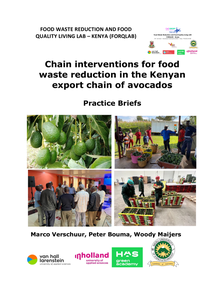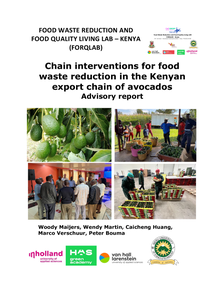From the article: "This article evaluates the application of blockchain technology to improve organic or fair-trade food traceability from “Farm to Fork” in light of European regulations. This study aims to shed light on the challenges in the organic food chain to overcome, the drivers for blockchain technology, and the challenges in current projects."
DOCUMENT

This study proposes a systematic value chain approach to helping businesses identify and eliminate inefficiencies. The authors have developed a robust framework, which food-sector entrepreneurs can use to increase profitability of an existing business or to create new profitable opportunities. The value chain approach provides win-win opportunities for players within the value chain. To test the robustness of the framework, the authors use food waste as an example of a critical inefficiency and apply it to two different food sector business cases, each operating in diverse conditions. Because the suggested framework addresses the core elements and parameters for the existence and competitiveness of a business, the model can be adapted to other sectors.
DOCUMENT

This booklet presents the practice briefs (popular papers) of master and bachelor theses and business assignments of students at three Dutch Universities of Applied Sciences: Van Hall Larenstein (VHL), InHolland and HAS Green Academy, and Meru University of Science and Technology in Kenya. All theses and business assignments were commissioned through the researchproject entitled “Food Waste Reduction and Food Quality Living Lab (FORQLAB)” in Kenya.
DOCUMENT

From the article: Abstract Since more and more business rules management solutions are utilized, organizations search for guidance to design such solutions. Principles are often applied to guide the design of information systems in general. Scientific research on principles for business rules management is limited. The purpose of this paper is to specify, classify, and validate design principles that can be applied to guide the design of a business rules management solution. We conducted a three round focus group and three round Delphi Study, which led to the identification of 22 principles. These 22 principles can be clustered into four categories: 1) deep structure principles, 2) physical structure principles, 3) surface structure principles, and 4) organizational structure principles. Our results provide a framework for the design and analysis of business rules management solutions.
LINK
This publication the avocado advisory report which is based on popular papers (practice briefs) of master and bachelor theses and business assignments of students at three Dutch Universities of Applied Sciences: Van Hall Larenstein (VHL), InHolland and HAS Green Academy, and Meru University of Science and Technology in Kenya. All 23 theses and business assignments were commissioned through the research project entitled “Food Waste Reduction and Food Quality LivingLab (FORQLAB)” in Kenya.
DOCUMENT

With this project we strived to contribute to structural reduction of post-harvest food losses and food quality improvement in the Kenyan avocado and dairy value chains through the application of technical solutions and tools as well as improved coordination in those food chains. The consortium had four types of partners: 1. Universities (2 Kenyan, 4 Dutch), 2. Private sector actorsin those chains, 3. Organisations supporting those chains, and 4. Network partners. The applied research has been implemented in cooperation with all partners, whereby students at involved universities conducted most of the field studies and all other consortium partners support and interact depending on the phases.The FORQLAB project targeted two areas in Kenya for both commodities, a relatively well-developed chain in the central highlands and a less-develop chain in Western-Kenya. The research methods were the business to business and multi-stakeholder (living lab) approaches to increase the potential for uptake of successful interventions in the chain. The project consisted of four phases: 1. Inventory and inception, 2. Applied research, 3. Spreading research outputs through living lab networks, 4. Translation of project output in curricula and trainings. The outcomes were: two knowledge exchange platforms (Living Labs) supported with some advice for sustainable food loss reduction, a research agenda, proposals for ICT and other tech solutions and an implementation strategy; communication and teaching materials for universities and TVETs; and knowledge transfer and uptake.
DOCUMENT

Western-European consumers have become not only more demanding on product availability in retail outlets but also on other food attributes such as quality, integrity, and safety. When (re)designing food supply-chain networks, from a logistics point of view, one has to consider these demands next to traditional efficiency and responsiveness requirements. The concept ‘quality controlled logistics’ (QCL) hypothesizes that if product quality in each step of the supply chain can be predicted in advance, goods flows can be controlled in a pro-active manner and better chain designs can be established resulting in higher product availability, constant quality, and less product losses. The paper discusses opportunities of using real-time product quality information for improvement of the design and management of ‘AgriFood Supply Chain Networks’, and presents a preliminary diagnostic instrument for assessment of ‘critical quality’ and ‘logistics control’ points in the supply chain network. Results of a tomato-chain case illustrate the added value of the QCL concept for identifying improvement opportunities in the supply chain as to increase both product availability and quality. Future research aims for the further development of the diagnostic instrument and the quantification of costs and benefits of QCL scenarios.
DOCUMENT

How do we increase biodiversity in the Netherlands? By working together! What can food forests and restaurants mean for each other? This report focuses on the question: “What is the potential of collaborations between food forests and restaurants in the Netherlands?”Interviews revealed that successful partnerships are based on direct supplier relationships, internal motivation and niche products that create a unique selling point.
DOCUMENT

This research is commissioned by the professorship Novel Proteins: Insects and Fish, Healthy, Sustainable and Safe (INVIS) and conducted with the aim to investigate the constraints that hinder the uptake of insect-based feed in the Dutch finfish aquaculture branch and advise upon how to initiate a transition within the branch to adopt insect meal in fish feed widely. This is a underlying report of the webinar Insect culture in the Netherlands for feed and food on January 19, 2021.
DOCUMENT

Circularity and recycling are gaining increased attention, yet the amount of recycled plastic applied in new products remains low. To accelerate its uptake by businesses, it will be useful to empirically investigate the barriers, enablers, needs and, ultimately, requirements to increase uptake of recycled plastic feedstock for the production of new plastic products. During the six focus group sessions we conducted, a value chain approach was used to map the factors that actors face regarding the implementation of recycled materials. The identified factors were structured based on three levels: determining whether a certain factor acted as a barrier or enabler, identifying the steps in the value chain that the factor directly affected and the category it could be subdivided into. The results were then further processed by translating the (rather abstract) needs of businesses into (specific) requirements from industry. This study presented eight business requirements that require actions from other actors in the value chain: design for recycling, optimised waste processing, standardisation, material knowledge, showing possibilities, information and education, cooperation, and regulation and government intervention. The main scientific contributions were the value chain perspective and the applied relevance of the findings. Future studies may delve deeper into the individual factors identified.
MULTIFILE
